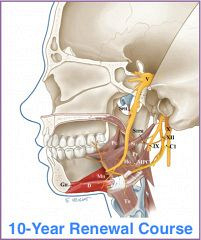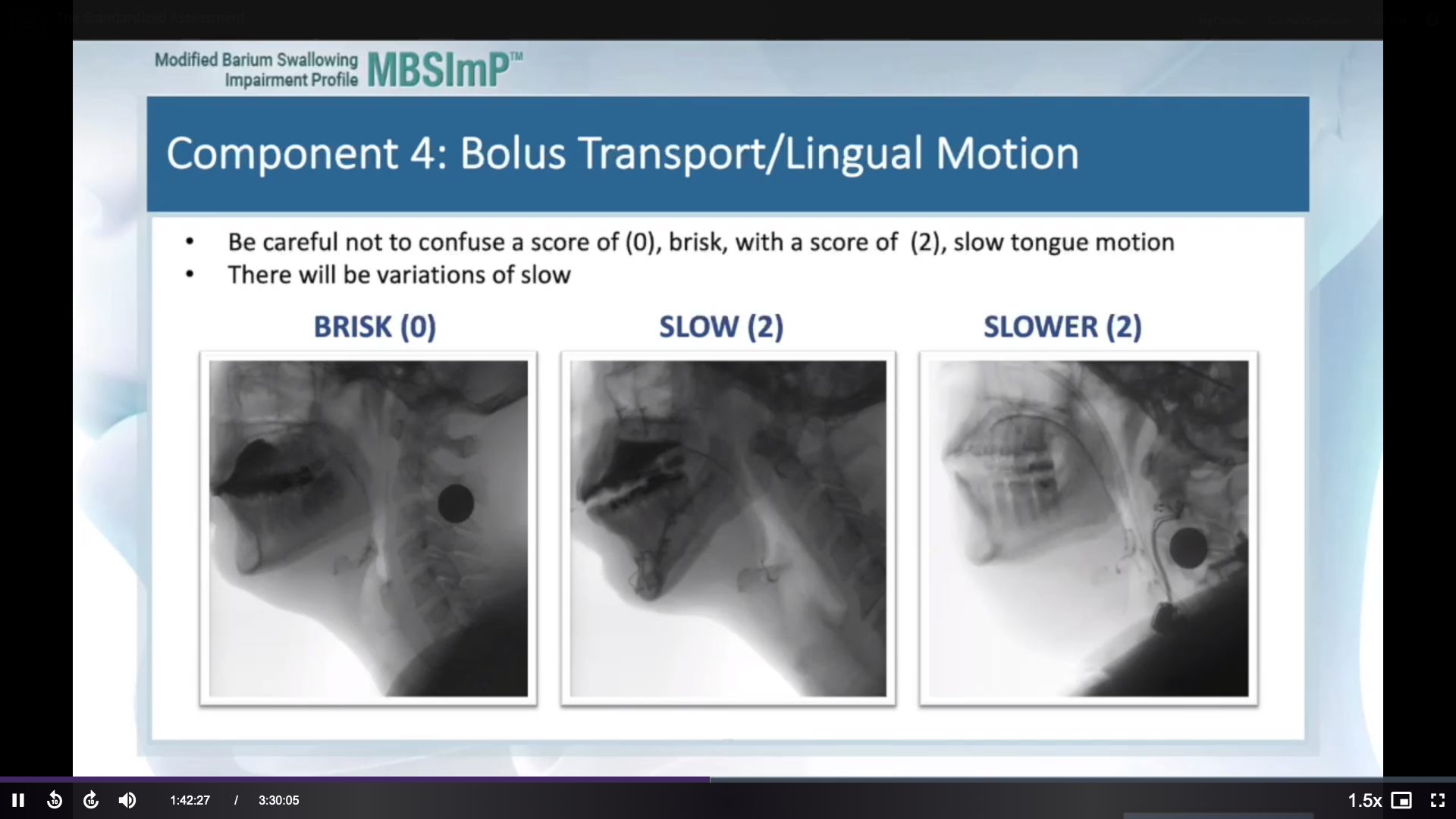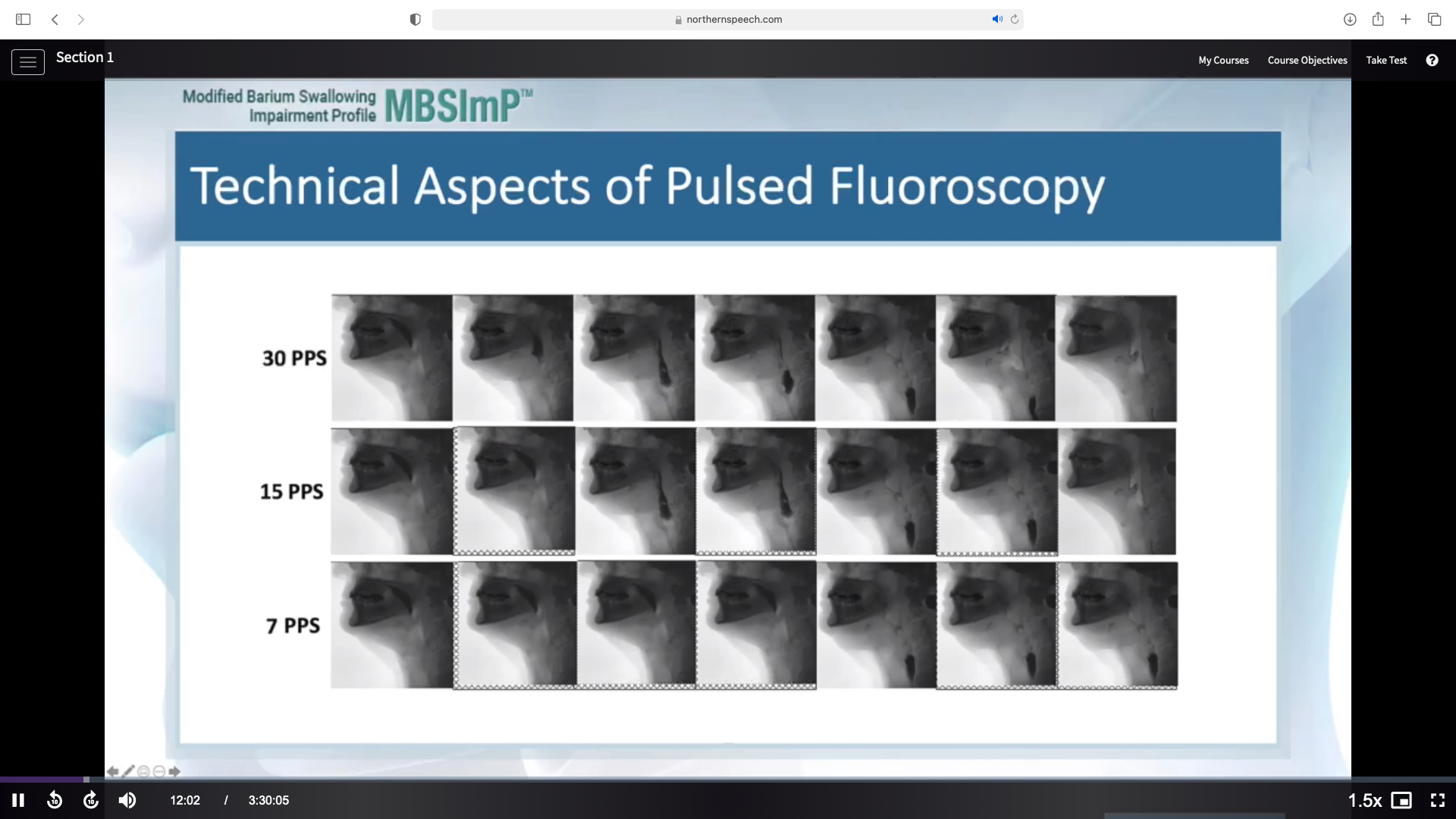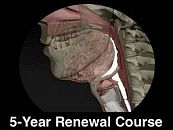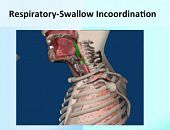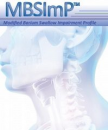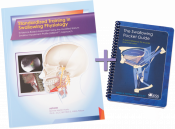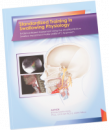MBSImP™ Renewal Course To Maintain Registered MBSImP Clinician Status: 10-Year Renewal #e273
Presenter: Bonnie Martin-Harris, PhD, CCC-SLP, BCS-S, ASHA Honors
MBSImP™ 10-Year Renewal Course
This online course serves as the MBSImP™ 10-Year Renewal Course for Registered MBSImP Clinicians. This course will review MBSImP scoring, including nuances for assessing the more challenging physiologic components. Updates on recent clinical research and future directions is included. Successful completion of this course will maintain your listing within the public database of Registered MBSImP Clinicians and extend your access to MBSImP.com, including continued access to the online templates for generating standardized assessment reports. See below for enrollment eligibility.
The content of this course serves the following purposes:
- Support your professional development and advanced competency in the area of swallowing and swallowing disorders.
- Provide a summary of ongoing refinements to the MBSImP Protocol that have been informed by patient-centered research.
- Discuss and demonstrate nuances for scoring the more challenging physiologic components.
- Update recent clinical research dissemination.
- Highlight future directions.
Course Sections – Run Time: 3:31:12
- The Standardized Assessment (52:55)
- Methods of Scoring MBSImP (29:04)
- Scoring Review & Nuances for Components 1-9 (52:02)
- Scoring Review for Components 10-17 (47:09)
- Case Study (30:02)
- Post-Test: Multiple Choice & True/False Questions
Course is offered for 0.35 ASHA CEUs – 3.5 contact hours.
Eligibility for course enrollment requires prior completion of the course, #e128 – MBSImP 5-Year Renewal Course.
Course enrollment window opens at 1 year prior to your renewal deadline. Your renewal deadline is located on the home screen of www.mbsimp.com and is the date you completed course, #e128, plus 5 years.
– R.B., prior course participant
Read more comments about this course!
– K.M., prior course participant
Read more comments about this course!
Video PowerPoint presentation with author narration and downloadable handout. Stop and re-start the course at any point. Learners retain access to course content after completion for ongoing reference and review.
Post-test consists of multiple choice and true & false questions.
– S.G., prior course participant
Read more comments about this course!
This online CE course focuses exclusively on the MBSImP™ approach for swallow impairment assessment. Other assessment protocols will not be included in this course. Presenter financial and nonfinancial disclosures may be found in the Presenter & Disclosures area.
Reviews
"Nuances in scoring that are common when using the MBSImP was the best discussion. I liked the manner of presentation- combined powerpoint and video examples." M.L. (Jun. 2025)
"Reminders of scoring mistakes was very beneficial. I liked the ability to leave and return to the lecture sessions." H.S. (Jun. 2025)
"Review of parameters that have been changed was most helpful. I liked the specific examples." J.D. (Jun. 2025)
"Updated scoring criteria was the best discussion. I liked the new radiographic views via the TIMS system." M.S. (Jun. 2025)
"Review of specific difficult-to-score components was most helpful. Loved the focus on tricky scoring components and really appreciated the recommendations for treatment goals and objectives." E.M. (Jun. 2025)
"A review of the guidelines with regard to the different testing components as well as updated guidelines were most beneficial. Great review and update, MBSImP always keeps me on my toes and progressing in my practice." M.J. (Jun. 2025)
"Right vs left hemisphere strokes was the best discussion. Brief and informative." J.R. (Jun. 2025)
"The scoring portions with examples was most helpful. I liked the videoes." O.U. (Jun. 2025)
"The specifications of the components were most beneficial. I liked that the course was not too theoritical." C.D. (Jun. 2025)
"Loved the updated descriptions, visuals; and research. Liked the ease of use." S.B. (Jun. 2025)
"The detailed review and the calibration guide were most helpful. I liked the ability to stop and re-start and the printable materials." E.H. (May 2025)
"The discussions pertaining to classifying the degree of impairment in the oral and pharyngeal phases of swallowing were most beneficial. I liked the additional material regarding length of time of radiation exposure, treatment considerations, and the course's brevity." L.H. (May 2025)
"The case study with recommendations on choosing treatments for specific impairments was most beneficial. The combination of the visual presentation and handouts made it easy to follow." M.M. (May 2025)
"The frames per second discussion was valuable. The test was different from prior MBSIMP tests and more practical." R.R. (May 2025)
"I feel the whole standardization of the MBS and having all clinicians use the same procedures and terminology is very beneficial to our patients. I think it was a great review and method to make sure clinicians stay on par with completing MBSS's using MBSImP. Very beneficial to recertify every 5 years and review anything new. I like that this particular review discussed the areas where most errors are made." K.R. (Apr. 2025)
"I appreciated the review of common scoring errors on the MBSImP and also the discussion of the latest research that suggests how the components reflect function. I liked the relevancy to my daily practice." A.W. (Apr. 2025)
"Just the protocol and breaking down those frequently missed concepts were most beneficial. I really liked the examples of the frequently missed concepts." M.R. (Apr. 2025)
"Thorough presentation. Renewed focus on benefit of standardization, high yield of info from following this protocol. Also new overall total impairment scores for oral and pharyngeal domains that we can integrate." A.O. (Apr. 2025)
"I liked the new information that is now available because of the MBSImP." D.M. (Apr. 2025)
"The new oral and pharyngeal severity scoring totals were most useful. I liked the ease of use of this course." C.H. (Apr. 2025)
"Commonly missed items in scoring was helpful. I liked the course convenience, and review of updates to the MBSImP." N.F. (Apr. 2025)
"Explanation and video examples of where to look when scoring MBS to determine physiological function. I liked the video resources." S.K. (Apr. 2025)
"Nuance scoring discussions were helpful to review." M.M. (Apr. 2025)
"Great content with tips and research. I liked the common errors and scoring review." M.B. (Mar. 2025)
"I liked the updates on the current research, and the streamlined review of the protocol plus common errors/misconceptions which I found to be mistakes that I've made in the past when I was doing MBS!" K.B. (Mar. 2025)
"All of the information was beneficial! Great review! I enjoyed the updates and reminders of how to specifically look at what we look at!" R.O. (Mar. 2025)
"I look forward to logging in and seeing how the reports are generated. Excellent to provide common mistakes and errors in scoring." S.M. (Mar. 2025)
"I liked the explanation and common mistakes with each component. Very relevant and helpful." B.J. (Mar. 2025)
"Reviewing each component and scoring severity was helpful. Clear and concise information." J.M. (Mar. 2025)
"Helpful clarification of components that are more frequently scored in error. I liked the additional research arising from the more widespread use of the MBSImP." K.C. (Mar. 2025)
"I enjoyed the changes and definition that you guys have made on how to get the score in very objective ways. I liked the ability to take the course at your own pace." M.S. (Feb. 2025)
"I liked that this course reviewed difficult scoring questions." T.B. (Feb. 2025)
"I found it helpful when the instructor talked about the criteria and the link with treatment. This instructor is always very good!" A.D. (Feb. 2025)
"I appreciated going over each of the components and reviewing areas that frequently are missed. I appreciated that we were not tested again on the components. The quiz was simple and effective." K.M. (Feb. 2025)
"I liked the review and discussing common errors." J.S. (Jan. 2025)
"The case study was beneficial in highlighting the topics discussed in the lectures. Real examples presented." J.K. (Jan. 2025)
"Because I work in an outpatient setting, I find the goal writing was the most advantageous part for my setting. Also, in reviewing my caseload VFSS studies I continue to analyze them with the MBSImP protocol. I liked that I could pause the videos and work at my own pace." E.G. (Jan. 2025)
"The precision of when to score and the explanations of what is happening with other structures, which structures to pay attention to was helpful. I liked the ease of access, division of sections." A.S. (Jan. 2025)
"The updates on current research were very helpful." A.K. (Jan. 2025)
"Review of the swallow parameters and assessment criteria was beneficial." E.T. (Jan. 2025)
"Esophageal area and epiglottis were beneficial to discuss. I enjoyed the graphics." A.W. (Jan. 2025)
"An excellent review for analysis of components. The visuals and explanations were extremely helpful. Useful for daily practice." H.C. (Jan. 2025)
"Supraglottic swallow techniques and radiation exposure information were beneficial." D.H. (Dec. 2024)
"Loved the new research content presented. I loved that the course approached it as educating experienced clinicians who have used MBSImP for 10 years." B.R. (Dec. 2024)
"I use MBSImP daily, so I love the refresher. I love hearing Dr. Bonnie Martin-Harris do any presentations. I am looking forward to BabyIMP and the research she is doing about computer assisted technology with MBSImP." K.H. (Dec. 2024)
"Good review and state of the research update. Good visuals and content." K.O. (Dec. 2024)
"Concise and relevant information. Good review of the 17 components." M.H. (Nov. 2024)
"Always good to review components and sharpen one's accuracy in use of the instrument. Dr. Martin-Harris had some great anecdotes and factoids." C.H. (Nov. 2024)
"The new research supporting assessment on the 17 components. The review of the scoring in addition to the common errors. I really appreciated the updated views of the images. Course was well rounded with good explanation of the Assessment tool, the current research supporting the functional assessment components, and how this tool can be used to guide therapeutic interventions. The case study was a nice touch to put it all together in great detail." K.B. (Nov. 2024)
"Review of each component was beneficial. I liked the new research." C.J. (Oct. 2024)
"Beneficial review of the specific details of scoring - it's always helpful to have reminders after a while. Also, the review connecting component scores/impairments to EBP treatment approaches was a concise reminder. I liked that I could take the test/save and come back to the test and work at my own pace." A.L. (Oct. 2024)
"I really enjoyed the updated information for scoring the various components & emphasis on how components can direct the development of a plan of care. Well laid out & very practical." A.C. (Oct. 2024)
"Updated research was beneficial. I liked the inclusion of MBS videos featuring impairments." L.P. (Oct. 2024)
"New research and new training methods, as well as documentation that can be uploaded to Epic. Practical information that was to the point." L.W. (Oct. 2024)
"I liked all of the information, particularly radiation evidence." L.M. (Oct. 2024)
"I liked how Dr. Bonnie Martin Harris provided more specific definitions and anatomic locations on how to rate certain components of the MBSImP." A.M. (Oct. 2024)
"It was beneficial discussing functional categories based on Oral and Pharyngeal total scores. I liked the updated information and research." C.B. (Sep. 2024)
"I enjoyed going over the scoring on all the components." S.W. (Sep. 2024)
"The updated information on oral and pharyngeal severity will be very helpful." K.M. (Sep. 2024)
"Great examples of scoring and reference sheets." A.R. (Sep. 20
"Great pace, and the side-by-side examples were very helpful." A.G. (Sep. 2024)
"Video demonstrations, research studies to support findings were beneficial. Very good explanations as to how certain components impact swallow and why all components and trials are important." S.M. (Aug. 2024)
"I enjoyed the research introduction and updates. Enjoyed learning how the components are affected by each technique- strategy. It is so beneficial to SLPs who are doing a direct intervention." F.H. (Aug. 2024)
"Discussing what areas are difficult for clinicians and where we should be looking was beneficial. I liked the updates." C.M. (Aug. 2024)
"Beneficial review of videos and current issues. Nice, condensed and current research was helpful." A.T. (Aug. 2024)
"Review of the laryngeal elevation identification was beneficial." S.L. (Jul. 2024)
"I always appreciate the review of scoring each component. The information re: pps and fps is most helpful to me at the current moment as we are trying to see if we can increase our hospital’s radiology department policy on pps and fps for our equipment as they are below the 30 recommended. Again, the in-depth review of scoring for each component is always helpful. Slides were well written too to limit the amount of side note-taking that I had to do." L.T. (Jul. 2024)
"Review of component scoring was beneficial." D.C. (Jul. 2024)
"All of the review was incredibly helpful." A.H. (May. 2024)
"The overview and updates from the last time I renewed my MBSImP certification were very helpful. Thank you. The level of detail that Dr. Martin-Harris went into with regard to the anatomy and physiology of the swallow, each component and the frequently missed sections. I also appreciated the case study at the end of the course. Thank you, also, for the preview test. The addition of highlighting research was interesting and appreciated. Thank you." I.F. (May. 2024)
"I complete an average of 2-3 MBS a week and help train new staff. This is always such a good course. I enjoyed the thoroughness of the information." L.F. (May. 2024)
"The clarifications of scoring were helpful. I also liked the illustrations of differences in scoring." B.M. (May. 2024)
"I enjoyed how the case study was used to translate the evaluation into an intervention plan. It was a good update for someone who is experienced with dysphagia and VFSS but wants to improve scoring and interpretations." H.H. (May. 2024)
"The scoring components with examples were beneficial." P.D. (Apr. 2024)
"Review of scoring, particularly Components 8 and 15 which have always been a bit challenging for me. Straightforward notes and presentation." C.C. (Apr. 2024)
"Consistency viscosity comparisons of Varibar to IDDSI was helpful. I liked the review of the components." E.L. (Apr. 2024)
"The updated informational materials were beneficial. I liked the review of the frequently missed concepts on each swallowing component explained." M.A. (Mar. 2024)
"I appreciated the update on all the literature as well as the case study. Online and excellent slides." S.B. (Mar. 2024)
"I appreciated the attention to the scoring of components that can be problematic and appreciated the video examples of each. I liked the ease of access and clinical usefulness." K.N. (Mar. 2024)
"Great refresher for information. I enjoyed the thorough explanations." D.W. (Mar. 2024)
"Reviewing radiology safety, and use of the supraglottic technique were helpful to discuss. I enjoyed the new research." A.B. (Mar. 2024)
"Very practical! Beneficial review of specific components with suggestions for testing. Updates on recent research." C.S. (Mar. 2024)
"Reviewing updated findings (e.g., severity ratings) was beneficial. I liked the combination of modes of presentation." T.B. (Feb. 2024)
"Oral Total and Pharyngeal Total impairment profiles were beneficial topics. I enjoyed the lecture." K.M. (Feb. 2024)
"Refresher on specific physiologic components, highlighting common difficulty. Wasn't just another review, but focused on areas beneficial to a more seasoned clinician." A.P. (Feb. 2024)
"The sequence of administration of boluses was beneficial. I enjoyed the clarity of the videos." K.M. (Feb. 2024)
"I enjoyed reviewing the training sections." H.E. (Feb. 2024)
"I loved the case studies and how to make specific treatments work. The course was convenient, and I did not have to do it all in one shot and could come back to it." J.K. (Feb. 2024)
"Examples and discussion of pharyngeal contraction and the discussion of the contribution of tongue base retraction and laryngeal elevation on epiglottis inversion were beneficial. I liked the examples of the different impairment scores for each component." K.K. (Feb. 2024)
"All of the course was helpful and addressed some questions I had." K.M. (Jan. 2024)
"Dr. BMH continues to refine the MBSImP. Looking forward to more publications on translating the OT and PT Total Scores to dysphagia severity levels. This course was organized and concise. Material is broken down very well." E.K. (Jan. 2024)
"I liked the updates to teaching related to frequent errors in scoring and with literature." J.D. (Jan. 2024)
"I really liked the concrete examples with slides. This course was very comprehensive yet succinct." K.B. (Jan. 2024)
"Excellent refresher. All of this course was beneficial! I liked being able to take the course virtually." E.B. (Jan. 2024)
"The case study and treatment options indicated by MBSImP scores were helpful. The course was organized in a very easy to follow and easy to learn way." J.L. (Jan. 2024)
"Beneficial information on radiation and I liked the review of components." K.W. (Dec. 2023)
"Helpful to review common errors with the 17 components. It was interesting to learn about research re: barium risk, Oral Total and Pharyngeal Total impairment scores, and normal variability within some of the 17 scores. I liked learning about the research that has been done based on MBSImP." J.M. (Dec. 2023)
"Discussing common mistakes in scoring and reviewing thoroughly the correct anatomical landmarks for judging each component were helpful. Thorough course, the handouts were helpful, and the test corresponded well to the material." C.L. (Dec. 2023)
"This course gave me confidence in my scoring. Using anatomical landmarks for scoring was beneficial." S.H. (Dec. 2023)
"I liked the clarifications on the most missed items." K.M. (Dec. 2023)
"This course clarified many of the questions I had regarding the scoring of the MBSImP." A.J. (Dec. 2023)
"I really appreciated how the presenter addressed the questions raised by clinicians and provided details regarding these concerns. I also really appreciated the intervention plan model, which emphasizes the physiological parameters of swallowing targeted as therapeutical goals. I enjoyed the data from scientific literature throughout the presentation." E.R. (Nov. 2023)
"The research and evidence of the effectiveness of MBSImP was beneficial. I liked the updated information." E.B. (Nov. 2023)
"The case study was beneficial. Going through all of the components." E.S. (Nov. 2023)
"I found the sample targeted intervention plan for the case study especially helpful. I think the MBSImP is an essential assessment tool, and translating study findings to a structured intervention plan was reaffirming and highly beneficial. I liked that the course was split into easily watchable segments and the sample scores with accompanying video (especially the pharyngeal stripping wave)!" E.L. (Nov. 2023)
"All of the updated research that supports various components of the protocol was beneficial. I liked the real videos paired with a discussion about each scoring criteria for each component." K.T. (Nov. 2023)
"I enjoyed hearing the updates and latest info from Dr. Martin Harris." M.V. (Oct. 2023)
"Updated practice, presentation of research papers, clarification of components. I liked the examples and substantiating information." L.T. (Oct. 2023)
"Practical information which I can easily implement into my daily work. Reviewed component scoring and updated practices." D.S. (Oct. 2023)
"Relating scores/deficits to interventions was beneficial." K.M. (Oct. 2023)
"I liked the review of recent literature relating to MBSImP." A.C. (Oct. 2023)
"Clear and concise information. I found the overall review to be helpful as I found some of the scoring I had been doing to be not completely correct." J.D. (Oct. 2023)
"I really appreciated the review of the component scoring though the lens of most common errors. I also appreciated the case study which demonstrated how you would proceed with treatment. I was able to start and stop as my schedule allowed, that flexibility is very beneficial." E.B. (Sep. 2023)
"Radiation exposure was helpful to discuss. This course was a great review of scoring." M.S. (Sep. 2023)
"I really liked that this course delved into the practical applications for some of the scoring (applications for therapy, what might be compensatory movement for certain deficits, etc) beyond just how to score. This course felt more tailored to advanced practitioners, so it aligned with my current experience and skill set." C.E. (Sep. 2023)
"I found the case study to be most beneficial. I liked seeing the principles applied in real life." L.L. (Sep. 2023)
"I liked the review of scoring and then how it can be interpreted for therapy." L.M. (Sep. 2023)
"I liked that this course focused on common mistakes / problems. It also gave lots of great little tips and tricks for what to do in clinical practice." J.W. (Sep. 2023)
"Good refresher. I liked Dr. Martin-Harris' explanations on each component." C.E. (Aug. 2023)
"I liked seeing examples of the different impairments that would be scored differently. This course was easy to access and follow." J.T. (Aug. 2023)
"The application of assessment results to treatment objectives was beneficial. I liked the multiple videos with examples, and the MBSImP guide that corresponds with the videos and has the tips that were discussed in the course." A.H. (Aug. 2023)
"Bonnie is a great teacher. I liked the review of scoring specific components." H.H. (Aug. 2023)
"Straightforward. I liked the evidence based rationale for protocol." J.F. (Jul. 2023)
"I found the research updates to be quite helpful. It was also very helpful to be reminded of how to score certain components when there are gray areas or variations." A.V. (Jun. 2023)
"I liked the review of the esophageal clearance component - what it assesses and what it does not assess." S.M. (Jun. 2023)
"Discussing short and long term therapy goals was beneficial. This course was well organized." S.B. (May 2023)
"Research presented in very eye-friendly ways to show leadership regarding Varibar use/consistency and frames per second." A.D. (May 2023)
"I found the new research updates to be thought-provoking and informative. I also really liked the case study because it clearly demonstrated how establishing goals that targeted specific components from the MBSImP scoring can make such an impact on the plan of care." K.P. (Apr. 2023)
"I always learn something every time Dr. Martin-Harris presents. I loved the case study - how the goals were written and impairment-targeted therapy. Hearing her describe each component, the frequent errors seen, and reviewing the anatomy was incredibly beneficial. I liked the pace, the content, and the evidence/articles that were presented. I love Dr. Martin-Harris. I thought this course was all incredibly well done." K.M. (Apr. 2023)
"I appreciated the clarification regarding some of the more commonly confused items on the MBSImP. I appreciated the videos and examples." K.L. (Apr. 2023)
"I liked the discussions of EB papers. Very nice synthesis." A.B. (Apr. 2023)
"I liked all of it. This course was a great review." K.V. (Apr. 2023)
"It's always helpful to have a review of the material, even if you utilize it every day. I liked the case study." E.T. (Apr. 2023)
"Evidence-based application for each component. I loved the case study. Great presenter and excellent content." J.P. (Mar. 2023)
"Review of MBSImP scoring, especially with updates, was beneficial." M.T. (Mar. 2023)
"I liked the review of scoring in regards to tips and the most beneficial information was highlighted when scoring each component. I also really appreciated the case study. I liked the ability to go back and review certain portions as sometimes it was beneficial to hear the information more than once. I also appreciated that the course kept my place when I had to stop and then return to the course." S.B. (Mar. 2023)
"Review of what, where, when to score. I liked the MBS studies of each component." D.H. (Mar. 2023)
"The clarification and "takeaway" points that have been made since I first took the training were beneficial. Easy to access course. Anatomy illustrations were very helpful." M.J. (Mar. 2023)
"I liked the scoring details and troubleshooting for individual components." V.S. (Feb. 2023)
"It was all helpful and relevant - update on literature that applies to MBSImP concepts, the review of components highlighting what clinicians frequently do in error, and the case study." L.M. (Feb. 2023)
"I liked the clarification of frequently missed concepts, convenience and flexibility of course." S.P. (Feb. 2023)
"The information on categorizing mild, moderate, and severe impairment was beneficial. I liked the updated research literature on swallowing to support the use of MBSImP." R.B. (Jan. 2023)
"I loved reviewing the components and videos, and having the chance to preview the test while participating in the lectures." L.T. (Jan. 2023)
"I found it beneficial that we can quantify the levels of impairment based on research versus subjectivity. I liked the inclusion of the latest research and how it applies to our daily practice." J.T. (Jan. 2023)
"This course updated my understanding of scoring the MBSImP." S.B. (Jan. 2023)
"Very detailed and thorough course. Great review and references." D.E. (Dec. 2022)
"I liked the sections on common errors in scoring. The literature review related to MBSImP scoring was beneficial." D.B. (Dec. 2022)
"The connection between findings and treatment was beneficial for my daily practice." P.T. (Nov. 2022)
"Always good to review scoring guidelines. I liked the frequently missed info, and the new data on the importance of getting the A/P view." J.O. (Nov. 2022)
"All good! I needed the refresher, and gained some very helpful ideas for wording findings in my reports. I liked the review of select components with a focus on the aspects which are most challenging to clinicians as a whole." K.C. (Nov. 2022)
"Very helpful to go over common errors/difficult scoring aspects of MBSImP with guidance and video explanations." K.H. (Nov. 2022)
"Clear presentation, practical information, new information from past recertification, and re-introduction to the overall benefits of using this standardized protocol in the clinical management of dysphagia patients." C.G. (Oct. 2022)
"All of it was very beneficial for my daily practice. Easy to follow, functional examples provided." M.O. (Oct. 2022)
"The initial overview of barium products was helpful. I also enjoyed the responses to some of the "critiques" of the MBSImP. The protocol and reasoning/rationale/research were very clearly outlined. This was easy to complete in multiple sessions. I liked that it was broken into chunks - that made pausing and returning easier. I also appreciated the downloads." E.T. (Oct. 2022)
"I liked the treatment ideas related to scores on MBSImP, the practical information on why we use the MBSImP, review and updates on scoring, information on common mistakes when scoring, and the multiple choice test." D.B. (Oct. 2022)
"It was a great review. I liked the visuals, explanations, examples." J.W. (Oct. 2022)
"I liked the video examples, explanations of where scoring errors are made, and case study. I liked the application of MBSImP results to treatment planning." S.R. (Oct. 2022)
"The course is on-demand, mobile friendly." K.K. (Oct. 2022)
"I liked that this specific MBSImP course reviewed challenges that clinicians have with rating certain components and how to be more accurate with the ratings. As always, the visuals and seeing actual MBSs that review each component was extremely helpful." K.H. (Sept. 2022)
"The course is very thorough and supported by literature wherever possible. I enjoyed the in-depth "whys" provided for areas where things are often confused by clinicians, and for certain physiologic explanations made." L.M. (Sept. 2022)
"The ease of completion was nice. Good refresher." J.R. (Sept. 2022)
"The slowed tongue movement with its relationship to delayed initiation, the review of pharyngeal contraction with consideration of preferential flow and enlarged pharyngeal spaces, and the information regarding the availability of the app and its use in patient education at bedside were all beneficial information." T.M. (Sept. 2022)
"Specific breakdown of areas that are hard to assess. I liked the ease of course access." S.A.H. (Sept. 2022)
"The course is self-paced, easy to follow, and informative. Liked integration of scoring to functional goals and therapy techniques." A.T. (Aug. 2022)
"The MBSImP is important for my entire hospital SLP department for continuity of care and assessment." J.M. (Aug. 2022)
"I will use this information daily." T.S. (Aug. 2022)
"Liked the updates on research and review of MBSImP components. Very comprehensive review of information." E.M. (Aug. 2022)
"Very clear information with excellent references." E.M. (Aug. 2022)
"Liked that I was able to do this at my own pace & go back to concepts I needed to review." D.S. (July 2022)
"I liked the 'human' aspect by the presenter. The ongoing acknowledgement of learning and responding to frequently asked questions WITH explanations made this presentation resonate across all areas, and brought the clinician learners closer together/on a relatable level with the presenter." M.S. (July 2022)
"I really appreciated the review, and the supportive research was great! I need to go back and read the articles. Bonnie Martin-Harris is so knowledgeable! Greatly appreciate her work, research and teaching." K.H. (July 2022)
"I liked that Dr. Martin-Harris focused on updates and new information that has come up over the last few years. Thorough and a great review." S.G. (July 2022)
"Good clarifications/refreshers regarding component scoring. I liked that Dr. Martin-Harris continues to teach the course. The objective nature of the Dysphagia Severity Scoring based upon the numbers, the predictive values, targeted intervention plans with treatment, eliminating the subjective mild/moderate/severe statement." R.H. (July 2022)
"I liked the research that supports answers to FAQs." M.S. (July 2022)
"I liked the explanation of items frequently scored incorrectly, information on severity ratings, and step by step guidance through each component scored." T.A. (June 2022)
"The case study was well-outlined. And the overall design of course and visual examples were great!" H.H. (June 2022)
"I really appreciated the review of tricky to score portions of the exam." S.R. (June 2022)
"I liked the highlights of commonly misunderstood practices and reviewing those. I believe it will increase reliability between providers." K.M. (June 2022)
"It was nice to review the material and have the resources provided." L.N. (May 2022)
"As this is a renewal course, it was great to learn what the author reported as frequently asked questions or mistakes in implementing this protocol. It was worth to be asked to take this renewal course to update my learning based on my clinical experiences and advance my performance with higher accuracy." H.C. (May 2022)
"It was a nice refresher on the MBSImP, and I liked that it went over the common errors in scoring." F.W. (May 2022)
"The whole course was excellent and I really appreciated highlighting the typical errors made by clinicians on each scoring component. Glad to improve my assessment practice going forward! Enjoyed the sprinkling of relevant studies and how they relate to MBS assessment and the MBSImP specifically. Really enjoyed the discussion along the way that related to clinical implications in the real world." L.T. (May 2022)
"The case study was helpful in that I was able to quickly formulate three therapeutic techniques when learning that the focus of therapy would be hyolaryngeal movement. It was also good to see the formulation of LTG and STG with objective goal writing. I am motivated to use the report generator and dysphagia app in my practice." N.R. (May 2022)
"I enjoyed the suggestions of target areas for rehabilitation based on deficits." T.K. (May 2022)
"I liked that it was tailored for those of us who have used the MBSImP for many years." L.M. (Apr. 2022)
"I liked the video examples and the review of each component's scoring with updated tips." J.C. (Apr. 2022)
"The format was easy to complete. I appreciated the descriptions of areas where frequent errors in scoring occur." A.O. (Apr. 2022)
"I enjoyed learning about common errors in scoring. I liked the review of the components and updates on the research. This is beneficial in working with younger clinicians and making sure I am up to date. Great course!" A.G. (Mar. 2022)
"It was great to hear about updates from the literature. I especially found the information on tongue base movement contributing to epiglottic movement to be interesting." A.L. (Mar. 2022)
"I really appreciated the guide and the other supplemental materials. Also the information about esophageal screening and radiologist resistance was good." A.S. (Mar. 2022)
"I liked the real life examples going through the different components and how it included common mistakes." C.H. (Mar. 2022)
"I routinely complete MBSS utilizing the MBSImP and this was a great refresher. Providing a numerical rating scale to categorize impairment as mild, moderate or severe is beneficial." C.S. (Mar. 2022)
"I liked the recent research using MBSImP. Very well presented and updated by Dr. Martin-Harris." E.M. (Mar. 2022)
"Review of scoring especially those frequently missed items. I enjoyed the case study portion in turning impairment into practical, objective goals. I liked the set up with broken up presentations as well as option to preview of test prior." K.M. (Feb. 2022)
"A very practical course that covered decisions/judgements that arise in everyday practice with helpful advice on how to approach them. The interweaving of relevant research that has been carried out since I completed my initial MBSImP training 10 years ago was excellent - gives me renewed energy and enthusiasm to continue to pursue and promote standardized practice in relation to testing in my facility." A.C. (Feb. 2022)
"The guide and detailed review of each component with Conclusions and Clinical Implications as well as areas Frequently Missed were all very helpful. Dr. Martin-Harris did a great job of incorporating visuals as well as examples so that learning was more in line with applying new learning or clarifying an area that was fuzzy previously." C.W. (Jan. 2022)
"Excellent organization, presentation and very functional application. Thank you." J.G. (Jan. 2022)
"Thorough content. Well paced. Supported by research." S.W. (Jan. 2022)
"I appreciated the review of common errors that clinicians make in scoring and the corresponding visuals delineating structures and exactly where to focus judgement for components such as tongue base retraction. It is hard to stay up-to date for me during this pandemic as I just don't take time to read studies - I appreciate that Bonnie Martin Harris referenced the ongoing research and the findings that have published to date." N.L. (Jan. 2022)
"I especially appreciated the focus on common errors in scoring (vs reviewing the entire protocol in detail.) I also liked the case study that was very relevant to typical cases we see and the example of a treatment protocol, short and long term goals, and outcomes driving recommendations for the next level of care." D.A. (Jan. 2022)
"The format was conducive to a renewal course and provided valuable information in reasonable detail and within a reasonable amount of time." K.S. (Jan. 2022)
Course Objectives
- Summarize ongoing refinements to the MBSImP Protocol that have been informed by patient-centered research.
- Discuss the importance of a standardized assessment as it relates to radiation exposure and treatment planning.
- Access recent clinical research related to swallow assessment.
- Discuss nuances for scoring the more challenging physiologic components.
Presenter & Disclosures

Bonnie Martin-Harris, PhD, CCC-SLP, BCS-S, ASHA Honors, is the Alice Gabrielle Twight Professor in the Roxelyn and Richard Pepper Department of Communication Sciences and Disorders, and Associate Dean for Academic Affairs in the School of Communication at Northwestern University. She is also Professor, Otolaryngology-Head and Neck Surgery and Radiation Oncology, Feinberg School of Medicine.
She is a Past-President of the Dysphagia Research Society, past Chair of the Specialty Board for Board Certification in Swallowing and Swallowing Disorders (BCS-S), and Associate Editor for the Dysphagia Journal. She is an ASHA Fellow, recipient of the 2016 Admiral Albert J. Baciocco Innovation Award – Medical University of South Carolina (MUSC), The 2017 12th Annual Pepper Lecturer, Northwestern School of Communication, Honorary Member of the MUSC Chapter of The National Academy of Inventors, recipient of Honors from the South Carolina Speech-Language-Hearing Association (SCSHA), 2010 MUSC College of Health Professions Scholar of the Year Award, and associate member of the Academy of Otolaryngology-Head and Neck Surgery and the American Head and Neck Society.
Dr. Martin-Harris is the author and developer of the first standardized method for videofluoroscopic assessment of swallowing impairment (Modified Barium Swallowing Impairment Profile, MBSImP™), translated to research and clinical practice in the United States, Canada, and 13 additional countries. She is also the author of the manual, "Standardized Training In Swallowing Physiology—Evidence-Based Assessment Using The MBSImP Approach" published by Northern Speech Services. Her work is funded by the National Institutes on Deafness and Other Communication Disorders (NIDCD), the Veteran's Administration, and the Mark and Evelyn Trammell Foundation.
Presenter Disclosures:
Financial — Bonnie Martin-Harris is presenter of online CE courses sponsored by Northern Speech Services; receives royalties.
Financial — Bonnie Martin-Harris is the author of "Standardized Training In Swallowing Physiology — Evidence-Based Assessment Using The MBSImP Approach" published by Northern Speech Services; receives royalties.
Financial — Bonnie Martin-Harris' former employer, MUSC, receives royalties from Northern Speech related to enrollment tuition of the MBSImP Online Training.
Financial — Bonnie Martin-Harris' MBSImP research and development was funded in part by Bracco Diagnostics; received grant funding.
Financial — Bonnie Martin-Harris' research is funded in part by the Veteran's Administration (VA); receives grant and research funding.
Financial — Bonnie Martin-Harris' research is funded in part by the Mark and Evelyn Trammell Foundation; receives grant funding.
Financial — Bonnie Martin-Harris' research is funded in part by the National Institutes on Deafness and Other Communication Disorders (NIH/NIDCD); receives grant and research funding.
Nonfinancial — Bonnie Martin-Harris is associated with numerous journals, publications, and boards related to speech-language pathology; receives no compensation in these roles.
Intended Audience / Accreditation

This program is offered for 0.35 ASHA CEUs (Intermediate Level; Professional Area).

Intended Audience
- Speech-Language Pathologists
ASHA CEUs:
Northern Speech online courses are registered with ASHA and are offered for ASHA CEUs. The number of ASHA CEUs is noted above. Note that 0.1 ASHA CEU = 1 contact hour = equals 1 CEE.
Earning ASHA CEUs and the ASHA CE Registry:
To earn CEUs from this course and have ASHA CEUs submitted to the ASHA CE Registry, course participants must satisfy each of these requirements:
- Participants must meet the eligibility requirements to earn ASHA CEUs (see below).
- Participants must indicate – prior to course completion – their intent for Northern Speech to submit this course to ASHA.
- Participants must complete/view this course in its entirety.
- Participants must complete the course post test with a minimum of 80% accuracy.
- After successful completion of the post test and completion of the course evaluation, a certificate of course completion is presented to the participant electronically via PDF.
- For those participants who indicated their intent for the ASHA CE Registry, course completion status will be submitted by Northern Speech to ASHA within 45 days of the course completion date.
Eligibility To Earn ASHA CEUs:
Attendees must meet at least one of the following conditions in order to be eligible to earn ASHA CEUs:
- Current ASHA Member.
- ASHA Certificate of Clinical Competence (CCC) Holder.
- Licensed by a state or provincial regulatory agency to practice speech-language pathology (SLP) or audiology.
- Credentialed by a state regulatory agency to practice SLP or audiology.
- Credentialed by a national regulatory agency to practice SLP or audiology.
- Engaged in a Clinical Fellowship under the supervision of an individual with their ASHA CCC.
- Currently enrolled in a master's or doctoral program in SLP or audiology.
If an attendee is not an ASHA member or CCC holder but meets any of the above criteria, they may inform the ASHA CE Registry of their eligibility by visiting this site.
ASHA CE Registry:
During the enrollment process, if you select to receive ASHA credit for this course and if you provide your ASHA number, Northern Speech will automatically submit your CEU information to the ASHA CE Registry after successful course completion (80% on post test). This submission happens once per month, during the first week of the month. For example, if you complete your course on November 7th, Northern Speech will submit all November online course CEUs to ASHA during the first week of December. When ASHA inputs the information into their database, they will mark the course as completed on the last day of the month in which it was completed, so November 30th using this example. The certificate of completion available for you to print immediately, however, will reflect the actual completion date, November 7th in this example. Due to ASHA processing procedures please allow 2-3 weeks, from the submission date, for the course to appear on your ASHA transcript.
Licensing Boards: Most state licensing boards DO accept CEUs earned online (usually classified as home-study credits). Some state boards do, however, place a limit to the number of credits that can be earned via home study/online courses. For the most current information, we suggest that you contact your licensing board or agency to verify acceptance policies and/or any credit limits related to home-study courses prior to registering for this course.
Additional accrediting agencies by which Northern Speech is an approved CE provider:
- California: NSS is approved as a provider of continuing education by the California Speech-Language Pathology & Audiology Board. Provider #PDP4. Online CEU limits may apply; please contact SLPAHADB for current online CEU acceptance policies.
- Iowa: NSS is approved as a provider of continuing education by the Iowa Board of Speech Pathology and Audiology Examiners. Provider #169.
- Kansas: NSS is approved as a provider of continuing education by the Kansas Department of Health and Environment. Provider #LTS-S0005.
Frequently Asked Questions
Customer Support: Please phone 888.337.3866 or email info@northernspeech.com.
Course Completion Timeframe:
You have unlimited time to complete our online courses. You may log off and log on as often as you’d like to in order to complete all sections of a course.
However, completion dates are based on Eastern Standard Time. Therefore, if you need your CEUs by a certain date, be sure to complete the course test before 11:59pm EST on that date. For example, if you need CEUs before January 1st, you will need to complete the course test before 11:59pm EST on December 31st.
Content Access:
Access to course materials and content does not expire, even after completing the post test. You may continue to review course material by logging into your NSS account, clicking the My Online Courses tab, and then viewing your desired course.
Certificate of Completion:
On successful completion of the post test (80%), a certificate will be immediately available for download and/or printing. This certificate will include your name, date of completion (based on Eastern Time Zone, USA/Canada), and number of contact hours (CEUs / CEEs). Please note that CEUs are awarded on the date of successful test completion, not the date of course enrollment. Please ensure that you successfully complete the post test prior to any licensure renewal dates.
ASHA CE Registry Submission:
During the enrollment process, if you select to receive ASHA credit for this course and if you provide your ASHA number, NSS will automatically submit your CEU information to the ASHA CE Registry after successful course completion (80% on post test). This submission happens once per month, during the first week of the month. For example, if you complete your course on November 7th, NSS will submit all November online course CEUs to ASHA during the first week of December. When ASHA inputs the information into their database, they will mark the course as completed on the last day of the month in which it was completed, so November 30th using this example. The certificate of completion available for you to print immediately, however, will reflect the actual completion date, November 7th in this example. Due to ASHA processing procedures please allow 2-3 weeks, from the submission date, for the course to appear on your ASHA transcript.
Purchase Orders:
Purchase orders are currently not accepted for online orders, if you wish to submit a purchase order please do so at info@northernspeech.com or fax to 888-696-9655.
What is an Online Course?
Our Online Courses consist of video, audio, and/or text content and are offered for ASHA CEUs. Unlike a webinar, which requires participants to be logged on and at a computer at specific times, our Online Courses are available to you at any time, from any device, via your NorthernSpeech.com online account. You may work at your own pace and start and stop your course as you wish. Your course will conclude with a short post test. On successful completion of the post test (>80%), a printable certificate of completion is presented to you.
Receiving CEUs:
Northern Speech is an ASHA CE Provider and our online courses are registered with ASHA and offered for ASHA CEUs. Please note that successful completion of the online post test is required prior to the awarding of CEUs. Please contact your state licensing board for acceptance policies related to CEUs earned online. Please note that courses offered for university students are not applicable for CEUs.
Registering for an online course:
You may browse all online courses by clicking the Continuing Education tab above, then Online Courses. Once you find a course, click Enroll Now, and you will be asked to either log into your existing Northern Speech account or create a new online account. Once you’ve entered your account information and provided your credit card payment, your course will be immediately available to you.
Accessing your purchased course or returning to a purchased course:
You will be able to access your online course by logging into your Northern Speech account and then clicking the My Online Courses tab on your profile screen. Click the course you would like to start or to resume. From there, proceed through the course sections until you are ready to complete the post test. You do not have to complete your course all at once. You may log on and off as you wish.
Testing requirements:
Each online course concludes with a post test consisting of multiple choice or true & false questions. Scores of 80% or greater are required for successful course completion and awarding of CEUs. You may revisit course materials and retest as needed to achieve a passing score.
Number of CEUs offered:
We offer courses from 1 to 21 contact hours. Each course will note the number of CEUs offered. Please note that 0.1 CEU = 1 contact hour = 1 CEE.
State licensing boards and online CEUs:
NSS is an ASHA CE Provider and most state licensing boards DO accept ASHA CEUs earned online (usually classified as home-study credits). Some boards do, however, place a limit to the number of CEUs that can be earned via home study/online courses. For the most current information, we suggest that you contact your licensing board or agency to verify acceptance policies and/or any CEU limits related to home-study courses prior to enrolling in an online course.
Course formats:
Our course formats include: text, audio, video, and PowerPoint with author narration. Each course will note the format on the course description page. Most courses include closed captioning.
Course handouts:
Most of our online courses provide a link to download the accompanying handout as a PDF file.
Group discounts:
Groups of 3 or more are eligible for a 20% discount on each registration on most of our online courses. To receive this discount, registrations need to be processed together via the "Group Rates" tab on the Online Course of your choice.
Computer requirements:
For our online courses to function best, we recommend that you update your computer to include the newest version of your Internet browser (Safari, Chrome, Firefox, Edge, Internet Explorer, etc.) and newest version of your computer's operating system. Also a high-speed Internet connection is recommended (cable or DSL). Speakers or headphones will be required for many of our courses as many contain audio components.
Course Cancellation Policy:
A purchased online course can be exchanged, refunded, or transferred to another individual if contact is made with NSS (via phone or email) within 30 days of purchase and the course materials have not been viewed or downloaded.
Special Needs:
Please click here for any special needs requests, and we will do our best to accommodate them.
| Contact Us |
